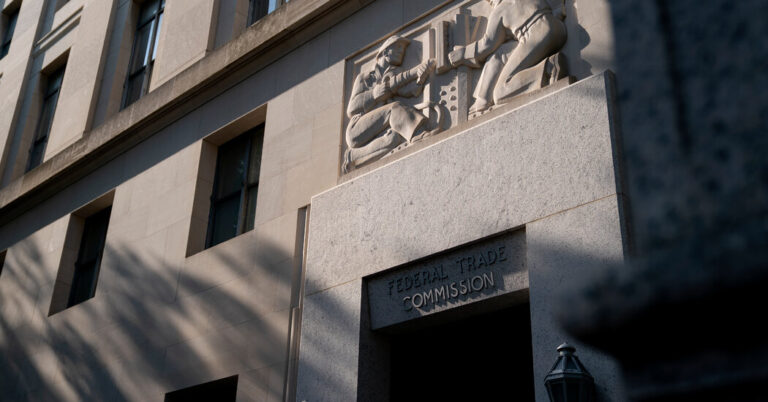The U.S. Chamber of Commerce claims in a lawsuit filed Wednesday that the Federal Trade Commission is overstepping its authority over its ban on agreements that prevent employees from leaving for rival companies. He fulfilled his promise to file a lawsuit.
The lawsuit, filed in federal district court in Texas, argued that the FTC lacks the authority to issue rules defining illegal methods of competition. The Chamber was also joined by three other business groups: Business Roundtable, Texas Business Association, and Longview Chamber of Commerce.
The lawsuit comes a day after the FTC released a final rule prohibiting non-compete agreements. The rule was approved on a 3-2 vote, with both Republican committee members voting against it.
The Chamber of Commerce announced shortly after the vote that it would object to the rule. The group’s lawsuit says the ban “represents a major overhaul of the nation’s economy and applies to many contracts that do not have the potential to harm competition in any way.” The agency does not have the authority to issue a ban, and even if it had the authority, it said a categorical ban on such agreements would not be legal.
Dallas tax services firm Ryan LLC also sued the FTC, making largely similar claims in a lawsuit filed in another federal district court in Texas. Ryan is being represented by Eugene Scalia, a partner at Gibson Dunn & Co. and former labor secretary during the Trump administration.
FTC spokesman Douglas Farrar said in a statement that Congress gave the agency authority to prevent “unfair methods of competition,” and believes that includes noncompete agreements. .
“Our legal authority is very clear,” he said. “Addressing competition violations that reduce the economic freedom of Americans is central to our mission, and we look forward to prevailing in court.”
The choice of venue for the case poses a challenge for the district court judges appointed by President Trump, Judge J. Campbell Barker in the Eastern District and Judge Ada Brown in the Northern District. The appeal will go to the 5th Circuit Court of Appeals in New Orleans, where 12 of the 17 judges were appointed by Republican presidents, six of whom were appointed by Mr. Trump.
The FTC’s rules would invalidate existing noncompete agreements, except for those that apply to executives in “policy-making positions” who earn more than $151,164 a year. It would also prevent companies from imposing new non-competes on executives.
It is expected to become law, likely this week, 120 days after it is published in the Federal Register, but could be embroiled in a lengthy legal battle.
Companies typically use non-compete to protect trade secrets and avoid spending money training employees who could jump to a competitor. The FTC and worker advocates argue that noncompete agreements stifle competition for workers and drive down wages.
The agency’s rules were supported by labor unions, including the AFL-CIO and the Building Trades Union of North America. Industry groups opposed to the rule included the Securities Industry and Financial Markets Association, a trade group representing Wall Street, and the American Trucking Associations.
Objections to the rule center on whether the FTC has the authority to make such a sweeping determination.
The agency said in its final rule that the law authorizes it to adopt rules “for the purpose of preventing unfair competitive practices” and “to define certain conduct as unfair competitive practices.”
The FTC relies on a 1973 appellate court decision in National Petroleum Refiners Association v. FTC that allowed the agency to issue substantive regulations. The case focused on the agency’s ability to require octane ratings to be posted on gas pumps.
Former FTC Chairman William Kovacic said the agency could face an uphill battle to fend off challenges to its non-compete rules.
“The FTC believes that prior case law and legislation has built a bridge to passing non-compete provisions,” Kovačić said. “The danger to the commission and its regulations is that the bridge is fragile, and the FTC wants to allow very large trucks to cross it.”
The effort to block the FTC’s non-compete rules comes amid widespread opposition from some companies, lawmakers and others to the agency’s authority.
The Supreme Court is expected to rule by June on a lawsuit seeking a narrower interpretation of the powers given to federal agencies. The suit, like the suit against the FTC, seeks to limit the agency’s powers to those expressly granted by Congress.
Companies including SpaceX, Trader Joe’s and Amazon are suing the National Labor Relations Board, which regulates labor relations, alleging it is unconstitutional.
Neil Bradley, the chamber’s chief policy officer, said such challenges are a “reasonable response” to federal agencies seeking to expand their powers.
“This overreach of micromanagement and the desire of government agencies to set new precedents is fueling many concerns in the business community,” he said.

